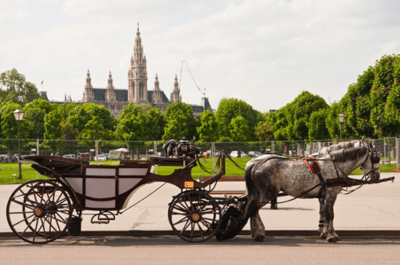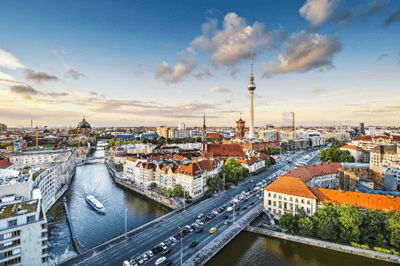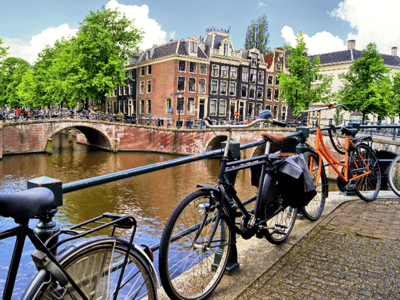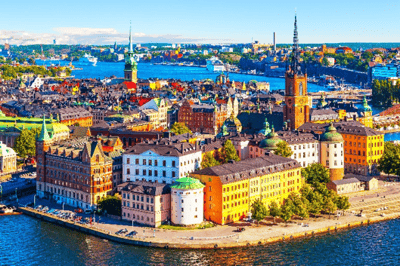The Safest Erasmus+ or Turing Destinations in Europe
Subscribe to Our Blog

Personal safety is an important factor when choosing a host country to study abroad. Europe is by far one of the most popular study abroad regions of the world. It can be quite difficult to decide which country is the best choice for you. Each city has its own unique qualities, that some people like and others not so much. Safety is essential to a student who's just arrived in a new city and must live on their own. So our safety factors include risk of natural disaster with crime, terrorism and war. We would like to give you some information about a couple of cities in Europe.
VIENNA (Capital of Austria)
 Not a year goes by in which Vienna, the capital city of Austria, does not top the rankings of the world’s most liveable cities. It’s not a surprise, really, with such a high standard of living at modest cost, a welcoming and tolerant environment, and an extremely low crime rate. The same is true of other cities in Austria, as well.
Not a year goes by in which Vienna, the capital city of Austria, does not top the rankings of the world’s most liveable cities. It’s not a surprise, really, with such a high standard of living at modest cost, a welcoming and tolerant environment, and an extremely low crime rate. The same is true of other cities in Austria, as well.
To complement these advantages, Austria’s higher education system enjoys an excellent reputation - with affordable tuition fees for foreign students.
According to the justification of European Best Destinations, Vienna is visited all year round by travelers who are looking for a safe and peaceful travel destination. Vienna is often chosen for this reason, which isn't just a feeling but a reality: the crime rate is three times lower than in all other European capitals. With its many parks and environmentally friendly transport, Vienna is one of the cities with the best quality of life in Europe. It is a good compromise for city travelers and nature lovers.
BERLIN (Capital of Germany)
 As the capital of Europe’s most powerful economy, Berlin holds great importance in the region. Well-known for its historical past, there are plenty of places throughout the city to immerse oneself in the rich history of Germany and Europe at large.
As the capital of Europe’s most powerful economy, Berlin holds great importance in the region. Well-known for its historical past, there are plenty of places throughout the city to immerse oneself in the rich history of Germany and Europe at large.
History has shaped Berlin into the unique and indescribably cool city it is today -- Berlin very much embodies the “hipster aesthetic” without sacrificing genuine character. It’s a great place for international students due to its diversity and wide range of sights and activities -- Berlin has something for every type of person to enjoy.
Home to over 3.5 million residents, the city is a bit too large to navigate by foot, but there is an amazing public transportation system that will allow you to explore every corner of this buzzing city. The capital, Berlin is home to many of Germany’s top universities and they are some of the best in Europe, indeed the world. Notoriously affordable, education is a key pillar of German society.
Daily expenses in the city can be a bit more expensive than other cities in Europe, but there are plenty of ways to enjoy everything Berlin has to offer on a budget – if you’re looking for a cheap snack be sure to try out currywurst, the delicious culturally mashup of German sausage and rich South Asian curry sauce.
Whether you enjoy the nightlife, historical sights, or interesting cafes, you'll never run out of things to do in Berlin.
Berlin is not the only great city in Germany, be sure to explore all of the other amazing cities to study in Germany.
AMSTERDAM (Capital of the Netherlands)
 A short walk down the shaded canals of Amsterdam is sure to steal the heart of just about anyone. This city has a lot to offer, much more than the stereotypes you might have heard of when it comes to the nightlife and the famed red-light district. Amsterdam -- like the rest of the Netherlands -- has a relaxed way of life. The city is not too large and it easily accessible by foot -- or if you want to live like a local -- by bike.
A short walk down the shaded canals of Amsterdam is sure to steal the heart of just about anyone. This city has a lot to offer, much more than the stereotypes you might have heard of when it comes to the nightlife and the famed red-light district. Amsterdam -- like the rest of the Netherlands -- has a relaxed way of life. The city is not too large and it easily accessible by foot -- or if you want to live like a local -- by bike.
There is a vibrant culture of music, making it a great place to go out as an international student. If nightlife is not your priority there are a plethora of cozy cafes and relaxing parks like the beautifully lush Vondelpark to pass the time. Strolling the canals will give you a great view of the city’s historic architecture and past. Amsterdam is ranked high because of its infrastructure that makes the city one of the most convenient and comfortable ones in the world.
There are almost no traffic accidents in the Dutch capital, all thanks to the culture of driving, that the residence have developed since they were kids. From an early age, they get on their bikes and start to learn the rules and what is most important - they learn that cyclists and pedestrians have the same (perhaps even more) rights than the city's drivers.
It’s a truly international city, as many students from around Europe, and the world, are attracted by the friendly nature of the Netherlands. Dutch is the national language but nearly everyone speaks English, so don’t worry too much about any language barriers. This is especially helpful if you’re looking to study in English as the courses offered at the top universities will have a wide range of subjects suitable for almost any student.
STOCKHOLM (Capital of Sweden)
 The capital of Sweden has the highest cyber and medical security in Europe. Stockholm is the city where residents and tourists feel safe all the time – the crime rate is one of the lowest in the world. Scandinavian countries are amongst some of the safest and always rank on top when it comes to the people's overall quality of life. Although there is almost no crime, the city is very well policed and all the officers speak English and are willing to lend a helping hand to everyone about everything. With Sweden, the only thing that you will truly need to protect yourself is a winter coat during the cold months.
The capital of Sweden has the highest cyber and medical security in Europe. Stockholm is the city where residents and tourists feel safe all the time – the crime rate is one of the lowest in the world. Scandinavian countries are amongst some of the safest and always rank on top when it comes to the people's overall quality of life. Although there is almost no crime, the city is very well policed and all the officers speak English and are willing to lend a helping hand to everyone about everything. With Sweden, the only thing that you will truly need to protect yourself is a winter coat during the cold months.
LONDON (Capital of Great Britain)
 The U.K. remains one of the most popular study-abroad locations in Europe with about half of all U.S. international students flocking there. London, the capital, holds not only 13% of the United Kingdom’s total population but also a large number of international students from the rest of Europe.
The U.K. remains one of the most popular study-abroad locations in Europe with about half of all U.S. international students flocking there. London, the capital, holds not only 13% of the United Kingdom’s total population but also a large number of international students from the rest of Europe.
As the largest city in Europe, London is by far the most culturally diverse. You can find any food or activity you can possibly imagine in this massive megalopolis. Each borough has a unique culture and feel – no one person could explore everything there is to experience in London.
Academically there is a multitude of high-ranking universities to choose from with wide ranges of course offerings in English -- it’s any academic’s dream.
Boasting a large international community, London is a great place to meet other international students from across the globe. Known for its incredible nightlife, delicious food, lush parks, and world-class museums, London could never bore you.
The rest of the U.K. has a lot to offer as well, be sure to see all the options with our list of the best cities to study abroad in the U.K.
DUBLIN (Capital of Ireland)
 Rolling green hills, rugged cliffs, and warm people are all images that invoke the essence of Ireland. Nestled around the River Liffey, Dublin has the gritty aesthetic of any port city - while also boasting stunning, modern buildings and historical buildings dating back hundreds of years.
Rolling green hills, rugged cliffs, and warm people are all images that invoke the essence of Ireland. Nestled around the River Liffey, Dublin has the gritty aesthetic of any port city - while also boasting stunning, modern buildings and historical buildings dating back hundreds of years.
It’s not a particularly large city, with just over half a million people, it is easily navigable by foot. Wandering the streets of Dublin you’ll never be short of entertainment, the city has numerous places to hit the town -- and the best access to a creamy pint of Guinness in the world.
You’re sure to love the cosiness of the old-fashioned pubs and cable-knit sweaters which are so abundant in Dublin. However, if you need quiet respite, you can always stroll through Phoenix Park, one of the largest parks in all of Europe.
The Emerald Isle is an exceptional place for any international student especially if you want to learn English and have an unforgettable experience overseas. Better yet if English is your native tongue, you’ll be able to study any academic discipline at one of Dublin’s many renowned universities.
We hope that we've given you an impression of where the next Erasmus+ or Turing internship should take place in terms of safety. Check our guide for Erasmus+ funding applicants for further information regarding the application process or read our Handbook for Erasmus+ Project Management & Execution.
If you want to learn more about the Turing program, read our article BREXIT - What's New for You? The Turing Scheme.

Comments: